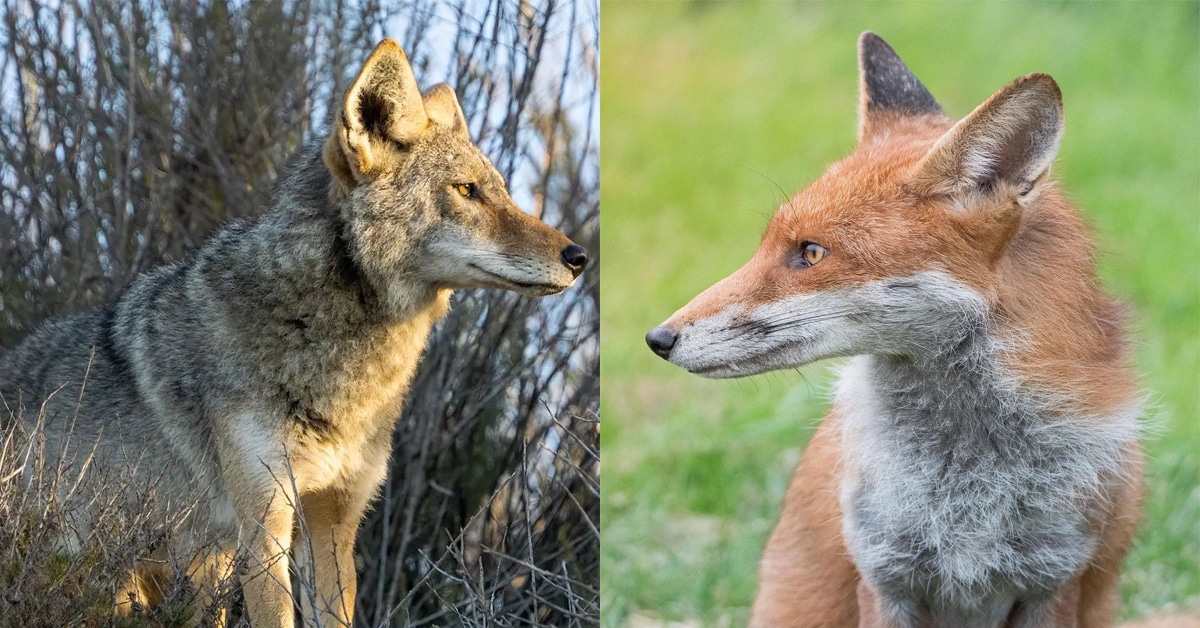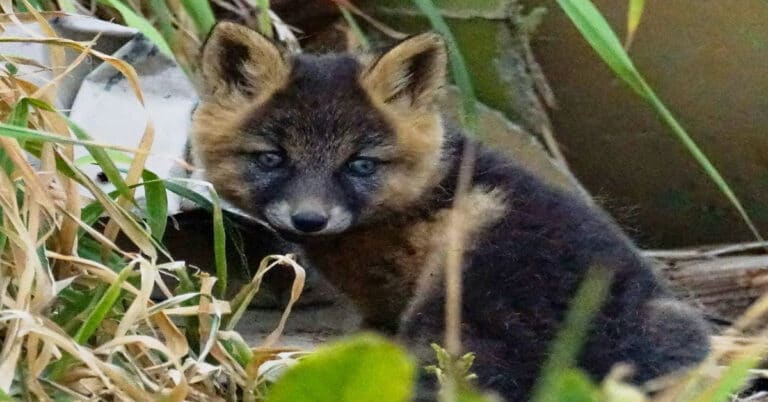Fox Vs Coyote – Differences & Similarities Of Most Widespread Canids
If you see wild canine animals in your garden or on your property, they are most likely foxes or coyotes. It can be pretty challenging to say what it is at first glance. They may look similar at first glance, but if you know their characteristics and differences, you can guess if your visitor is a fox vs coyote.
Coyotes and foxes come from the same family and are known as canines. The Canidae family is mainly divided into several parts. The foxes fall into the category of Vulpines. Coyotes fall into the canine type and are related to wolves, jackals, and dogs.
Biology Of Foxes
There are 23 species of fox. Gray and red foxes are the most widespread among all. They may be found across North America, Canada, South America, Europe, Asia, and even Africa. They are highly adaptable animals and can live in a variety of habitats, including grasslands, deserts, mountains, woods, and cities too.
They are afraid of coyotes invading their area, and therefore, some seek safety in settings near humans. Red foxes have a white tail tip, a long body-length tail, and black coloration behind the ear points. The gray fox’s tail has a black tip, and the ear tips have an orange tint. Only color variants change, while all other features are the same.
Foxes come in a variety of colors, but they all have similar visual characteristics such as pointed tails and large muzzles. They are the tiniest canines, weighing between 8 and 20 pounds.
Foxes may eat both small animals and fruits, depending on their diet. Rabbits, birds, reptiles, snakes, insects, and other small animals are among the prey they pursue. They are unable to hunt deer, sheep, goats, and other animals because of their size. They frequently preserve the leftovers to eat the next day. However, most of the time, coyotes notice and take their food.
Biology Of Coyotes
There are 19 subspecies of coyotes present today, and they are found all around the world. Coyotes, like foxes, can adapt to a variety of environments. North and South America are the main places where they live. Mountains, meadows, and deserts are among their natural environments.
They are mainly carnivorous animals. However, they will also eat plants such as fruits and vegetables on some occasions. Mainly, their diet includes deer, rabbits, hares, rodents, birds, reptiles, amphibians, fish, and invertebrates.
The main threats to coyotes are cougars, gray wolves, and humans. Coyotes are larger in comparison with foxes. Their weight can be anywhere from 20 to 46 pounds, which is significantly more than foxes. They are capable of hunting larger animals than foxes do. For example, they will hunt deer.
Coyotes are distinguished by their light gray, red, white, and black fur. Color changes may occur based on geographic location. The body is 40 inches in length. They have a bushy tail and a long, narrow nose with triangular ears. They have a blackish tip on the tail, which is generally shorter than the body. Coyotes have orange fur behind their ear tips.
Fox VS Coyote Families
The gestation period of fox vs coyotes is different. For Fox, it is approximately 53 days. Coyotes have a 60-day gestation cycle and mate from January to February. The breeding season for them starts in February and ends in May. They breed and give birth to 2 to 12 puppies. Female coyotes birth 2-10 babies.
Coyotes can survive and live without their parents for 7 weeks from birth. The babies can go hunting with their mothers when they are 7 months old. Fox Babies are born in the dens and kept there for 3 weeks. From the 4th week, they start leaving the den under the parent’s supervision, and by the time they reach six months, they start transitioning into adults.
Coyotes frequently live in groups. Foxes live in groups most of the time and hunt alone, although they do get together during mating season.
Appearance of Fox vs Coyote
Foxes are small in size and weight in comparison to coyotes and can weigh up to 20 pounds. Slanted eyes, erect ears, a long tail, short limbs, an elongated body, and a flat head characterize them. Coyotes have a long snout, and trapezoidal ears, and can weigh up to 46 pounds. They are bigger than foxes but not as big as wolves.
To compare fox vs coyotes in body size, coyotes seem to have the largest and most muscular appearance. Normally, coyotes have a body length of more than 3 feet, while the fox’s body length is typically less than 3 feet. The average height for coyotes is 2 feet. For foxes, this measurement is only an average of 20 inches. Even though the red fox is considered to be the largest fox in size, they are still smaller than coyotes. The legs of foxes are shorter and the body takes more of a tube shape.
The fur of the coyotes is mainly in gray shades and has a reddish tint around the flanks. Comparing the colors of fox vs coyote can be difficult because the fox species can come in many different coats. However, the most common foxes are red, gray, light brown, and silver. Even the red foxes come in different shades, such as silver, gray, and dark brown. Gray foxes can have similar colors as coyotes do.
The tail is another big difference that we can see in the appearance. Foxes are known for their fluffy and bushy tails that, most of the time, have white or black tips. When the fox is in action or runs, the tail stays up in the air. To compare fox vs coyote, the tail of coyotes is shorter in size, and when in action, it hangs down. Also, the tail of the coyote is not as fluffy as the foxes. Both
Eating Habits Of A Fox vs Coyote
Fox vs coyote diets overlaps in certain ways. This explains why coyotes and foxes often share the same habitat. They eat similar foods, such as rabbits, lizards, reptiles, and small mammals. However, coyotes have a larger body and therefore are capable of killing bigger prey. If the fox can hunt insects and eat them, the coyotes will not lose money preying on them and will choose a larger victim.
Coyotes have been known to prey on foxes and their cubs in the past. Other big animals that they hunt include tigers, bears, and even their larger siblings, the wolves. Coyotes can hunt during the day too when the foxes only come out at night and are nocturnal. Foxes are found to live all around the world, whereas the habitat of coyotes is mainly in North and South America.
Fox Vs Coyote Behavioral Characteristics
Foxes hunt alone most of the time. However, they live as a family during the mating season. In comparison, coyotes are more sociable and live in packs all the time. Similar to wolves, coyotes can adapt to living with others even though sometimes they may not be part of the family.
To discuss the vocality of fox vs coyote, coyotes are considered to be the most vocal canines in the entire world. The sound looks like a wolf-howl and has a rising and falling pitch. They also use barking, yelling, and yipping to communicate. Foxes are generally quiet animals, but they also howl. They have a high-pitched voice that does not sound like a wolf or dog.
Because of the similarities in their habits and the same living environment, their territories often overlap. Both of them mark their territories with urine. Animals have scent glands on their bodies and use them to find mates and also to mark their territory.
Some may state that they can interbreed. But guess what? It is wrong. They come from the same Canidae family. However, they are different species. That is, they are incompatible with each other and do not have the same number of chromosomes to interbreed.
Both animal species use the den during the mating season. However, the foxes prefer to stay in the den and sleep there, while coyotes will only use it voluntarily when mating. Coyotes mostly make their dens under the boulders and dig out pretty deep.
To compare fox vs coyote, they are both adaptable and will live in an urban setting. One of their characteristics is that they both mark the territory and let others know that they live there. However, coyotes will abandon their dens when the babies are born, and males will try to avoid it when the babies are raised. Coyotes have been observed invading fox habitats and even occupying their dens and giving birth to their babies there.
Bottom Line Of Fox vs Coyote Comparison
Foxes and coyotes are the two most widespread wild canids in the world. Even though at one glance they may seem alike, it is not hard to find differences between fox vs coyote. The easiest way of identification is by the body size and tail shape.
Fox vs coyote fights often happen. They mostly overlap because of the same diet and living habitat. They are considered natural enemies. Coyotes are generally stronger and bigger than foxes, so if they fight, most likely coyotes will kill a fox. Coyotes can be brutal and will eat the fox after killing it if they are hungry.

Nato is a content writer and researcher with a background in psychology who’s eager to explore the wonders of nature. As a travel enthusiast and animal lover, she hopes to inspire others to discover and cherish the beauty and importance of the natural world.







